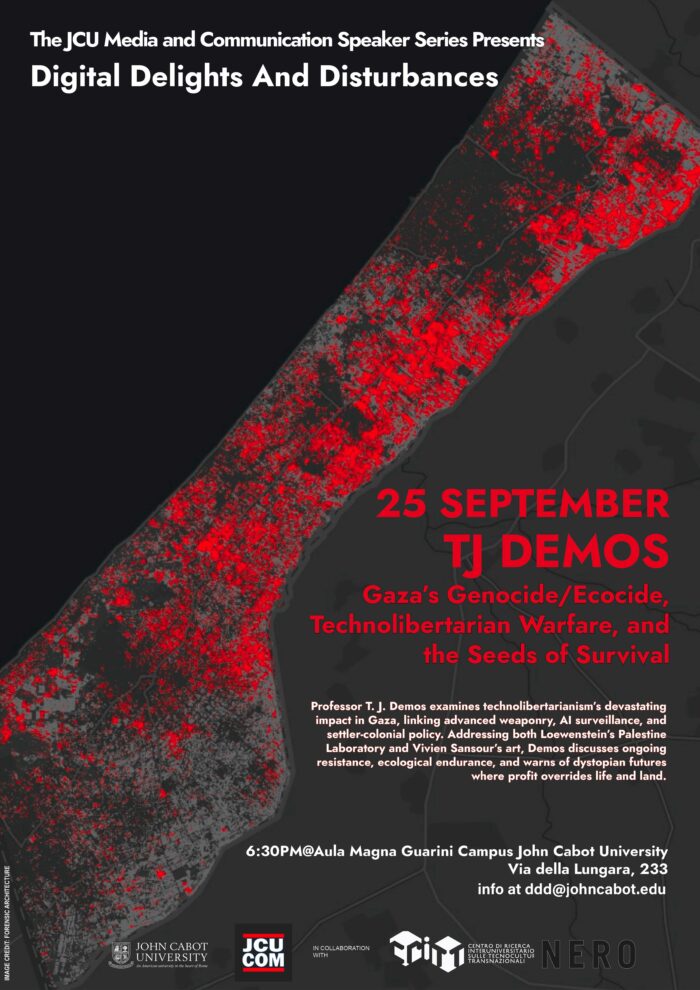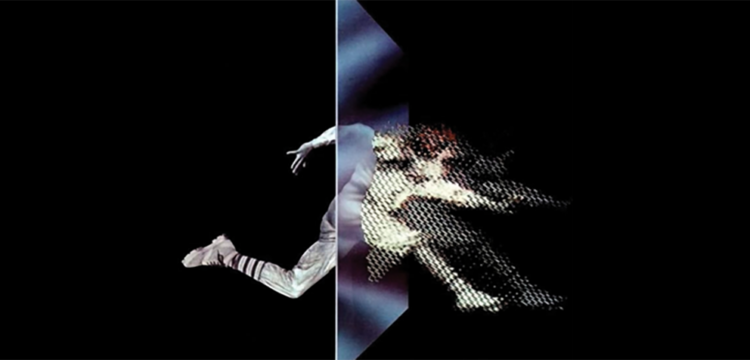Gaza’s Genocide/Ecocide
Technolibertarian warfare, and the seeds of survival
Happening on September 25th at 6:30PM at John Cabot University’s Aula Magna (via della Lungara 233, Roma), this lecture marks the first installment of the Fall 2025 Digital Delights and Disturbances talk series, hosted by the Department of Communication and Media Studies. In this opening lecture, Professor T. J. Demos explores the grave consequences of technolibertarianism revealed through Israel’s recent genocide and ecocide in Gaza. Drawing from Anthony Loewenstein’s concept of The Palestine Laboratory, Demos examines how advanced weaponry and AI surveillance, developed and tested through violent ethnic cleansing, forge a path where corporate interests supersede the basic rights to life and land. This fusion of libertarian ideology and Israeli policy constructs a deeply troubling vision: Gaza, as a site of appalling devastation, is not only a present-day tragedy but also a warning for potential dystopian futures.
The talk will also engage with the artwork of Palestinian artist Vivien Sansour, whose political ecology refuses this destructive trajectory. Her botanical interventions cultivate space for Palestinian endurance and solidarity—among both humans and non-humans—challenging settler-colonial erasure and nurturing ties to land and collective survival. Professor Demos, an esteemed scholar and founding Director of the Center for Creative Ecologies at UC Santa Cruz, brings a wealth of expertise on visual culture, ecology, and decolonial politics to this urgent conversation.
Digital Delights & Disturbances (DDD) offers radical ways to think out-of-the-(digital)-box we live in, imaginative and informed food for thought to feed our souls lost in the digital mayhem. DDD is organized and sponsored by the Department of Communication and Media Studies at John Cabot University, in collaboration with NERO and CRITT (Centro Culture Transnazionali).
Make sure to RSVP via this link. More info at [email protected]
How Palestine and Gaza are warning for potential destructive futures?
T.J. Demos: At COP28 in Dubai, Gustavo Petro, the president of Colombia, warned that what we are witnessing in Gaza—the mass death, the technological systems of destruction, the surveillance and drone warfare, the unleashing of genocidal violence by a powerful state against a desperate population—is “a rehearsal of the future,” one that awaits those displaced by the climate crisis in the Global South.
If Gaza’s destruction is part of a century-long war on Palestine, then the crisis is not only historical but also ominously prefigurative. It reveals the foundations of a world-building project that is, at the same time, a world-ending one. This dynamic echoes Anthony Loewenstein’s thesis in The Palestine Laboratory, which shows how Gaza operates as a testing ground where Israeli military firms refine their AI-abetted weapons systems and surveillance tools before marketing them as “battle-tested” to authoritarian regimes across the globe. Israel emerges as a global paradigm: a new model for the alliance of right-wing venture capitalists, Christian nationalists, and Jewish supremacist Zionists who embrace Netanyahu’s Israel as prototype of an illiberal, post-democratic West.
This project converges with the ambitions of Trump, Orbán, Putin, Erdoğan, and Modi—what the Progressive International calls the “reactionary international”—leaders intent on reshaping global politics around authoritarian nationalism while dismantling the remnants of liberal society. Under a second Trump administration, this trajectory is accelerating. Despite its isolationist rhetoric and economic nationalism, illustrated by tariff wars, the administration prioritizes war profits and extractive plunder (including of its country’s own educational, media, regulatory and health care institutions) in pursuit of global dominance, entrenching militarized repression, surveillance capitalism, and corporate warfare as the pillars of a new authoritarian world order.

How is Israel embodying technolibertarian necropolitics?
Major U.S. corporations sit at the heart of Gaza’s devastation, both enabling and profiting from a campaign that exemplifies climate colonialism. Central to this apparatus are predatory tech corporations like Palantir, the data-mining giant led by Peter Thiel and Alex Karp, widely described as “the AI arms dealer of the 21st century.” Alongside it, Amazon Web Services, Google, and Microsoft provide cloud infrastructure, logistics, and data systems to the Israeli Defense Forces (IDF), directly sustaining military operations. Elon Musk’s Starlink, with its thousands of low-orbit satellites, has secured Israeli battlefield communications throughout the war. Collectively, these corporations have engineered the digital scaffolding of occupation and mass murder—drones, checkpoints, metadata surveillance, satellite imaging—deployed to monitor, target, and eliminate populations deemed disposable.
These corporate elites form a technolibertarian billionaire class driving Israel’s war machine. Palantir made its allegiance explicit with a full-page New York Times ad on October 26, 2023, openly endorsing Israel’s assault. Thiel’s influence extends deep into US politics, from funding Senator JD Vance to maintaining ties with the White House. Palantir operates seamlessly with the American arms industry, Israeli defense contractors like Elbit Systems, and intelligence units such as Unit 8200, creating a tightly integrated war economy.
Understanding this nexus requires examining technolibertarianism itself. Rooted in far-right thinkers like Friedrich Hayek, Ludwig von Mises, and Murray Rothbard, it elevates absolute individual freedom while rejecting state governance. In practice, this ideology fuses economic and social liberties into a doctrine of world-ownership, privileging corporate power over democratic accountability. Its contradictions are stark: liberty is reserved for plutocrats and their corporations, while justice and collective rights are systematically eroded. As Thiel bluntly asserted in 2009, “freedom and democracy” are incompatible.
Israel, often branded the “start-up nation,” starkly embodies the contradictions of technolibertarian ideology and settler-colonial power. As Noura Erakat describes, it operates as an “apartheid democracy”—justice for some, exclusion for others—built on a century of violent eliminationism. This system has found ideological reinforcement in US-backed libertarian think tanks such as the Cato Institute, founded by Murray Rothbard and supported by Thiel. In Israel, groups like the Kohelet Policy Forum, the Tikvah Fund (recently funded with US $10m by the US government), the Ayn Rand Institute, and the Israel Law and Liberty Forum advance this vision, wielding the language of freedom while binding it to Jewish supremacism, settler expansion, and militarized rule over Palestinians.
At the heart of this paradox is a strain of Israeli Objectivism rooted in Ayn Rand’s libertarian philosophy of greed, radical individualism, and deregulated capitalism. Proponents frame Israel’s actions as defense of democracy and freedom against terrorism, yet remain silent on its long settler-colonial project and systematic denial of Palestinian rights. As Alberto Toscano warns, the fusion of social libertarianism with political authoritarianism forms the seedbed of fascism. Israel represents its extreme contemporary form, with Gaza as both its killing field and its profit-driven laboratory. The assault on Gaza illustrates these dynamics with unprecedented clarity. What has resulted is the world’s first technogenocide: the fusion of ecocide and genocide through cutting-edge military technology and environmental destruction. Central to this is “Lavender,” an AI-driven targeting system developed by Unit 8200. Investigations by +972 Magazine revealed Lavender flagged over 37,000 targets with minimal human oversight, generating airstrikes that killed civilians at ratios of hundreds to every alleged Hamas fighter. Journalist Yuval Abraham calls it a “mass assassination factory,” erasing distinctions between combatant and civilian, adult and child. The siege, combined with forced displacement into so-called “safe zones,” the weaponization of engineered famine, extends Israel’s settler-colonial project of erasure—what we might call “ontocide,” the destruction of everything in Gaza—the culmination of technolibertarian eliminationism.
How are you thinking with the work of Vivien Sansour?
Sansour’s artistic practice—anchored in socio-ecological projects like the Palestine Heirloom Seed Library (2014–ongoing) and Traveling Kitchen (2018–ongoing)—is a testament to Palestinian life and land in defiance of Israel’s genocidal-ecocidal destruction. Sansour’s political ecology cultivates a caring space where Palestinian resistance takes root through human and more-than-human solidarities. Her work enacts a botanical politics of life: a collective will to endure that thrives through multispecies collaboration, through botanical comradeship, through sharing food and stories of Palestinian heritage. Her art directly contests settler-colonial domination, which seeks to sever Palestinians from their land and dismantle shared forms of belonging. As a form of survival media, Sansour’s “seeds of futurity” defy the technolibertarian, eliminationist order that aims to erase and defuture Palestinian existence. Against its exalted settler-colonial expansionist property regime—one that denies Palestinian relationality and existence—her work offers an insurgent freedom, opposed to the freedom systematically withheld from the colonized.
Rooted in the West Bank—itself under intensified settler siege in recent months—Sansour’s art exemplifies creative world-building. It parallels acts of foraging and farming in Gaza, where starvation has been weaponized to shatter Palestinian dignity, belonging, and solidarity. Even under conditions of extreme scarcity and constant bombardment, Gazans persist in cultivating food and sustaining mutual aid. Figures like Hamada Shaqoura, the organizers of Gaza Soup Kitchen and Mrs. Najah’s Kitchen, and individuals such as Mohammed Qomssan continue to grow and distribute food, defying annihilation through practices of collective care (even as such practices become ever tenuous, even impossible, amid current famine conditions).
These acts of cultivation and sharing, like Sansour’s artistic practice, embody resistance to the genocide-ecocide nexus. They insist that even in the face of destruction, solidarity and sustenance endure as powerful forms of defiance. Together, they affirm a politics of survival rooted in land, life, and collective care—proving that the struggle against erasure continues to bear seeds of futurity.




